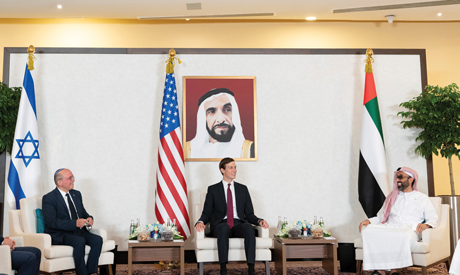
Israeli national security advisor Ben-Shabbat, US president’s senior adviser Kushner, and UAE’s national security adviser Sheikh Tahnoun in Abu Dhabi (photo: Reuters)
In a “historic” development, an Israeli commercial flight flew for the first time from Tel Aviv to the UAE capital Monday carrying a joint American-Israeli delegation to discuss with Emirati officials details of the peace deal announced 13 August.
Onboard was Senior White House adviser Jared Kushner, who is US President Donald Trump’s son-in-law and a key architect of Washington’s Middle East policy. The American delegation was led by US National Security Adviser Robert O’Brien and the Israeli delegation was led by National Security Adviser Meir Ben Shabbat.
On arrival in Abu Dhabi, Kushner thanked Saudi Arabia for allowing the flight to use Saudi airspace. Israel media reported that Saudi authorities gave permission to the Israeli flight on US request and because a senior American delegation was onboard.
The Israeli delegation, including economists, scientists and planners, would meet UAE officials “in preparation for the signing of cooperation agreements in the civil and economic fields”. The two-day visit also aimed at setting a date for the signing of the Abraham Accord — as the Israeli-Emirati peace deal is called — with the US as a third party, probably in September.
Though the main theme of the negotiations in Abu Dhabi looks economic, preparing for trade, economic and technological cooperation and joint investment agreements, political and diplomatic aspects are not absent. Israel is keen on signing an agreement to open embassies and to formalise diplomatic relations as soon as possible.
The official Emirati news agency quoted Lior Haiat, spokesperson for Israel Ministry of Foreign Affairs, as saying: “We hope that it would be a quick process and within a few weeks or months we would be able to see the fruits of this process.” The Israeli official said that “the delegation will discuss with Emirati officials diplomatic relations, tourism, science and space, trade and investments, as well as cultural and health research”, the Emirati news agency reported.
Abu Dhabi-based English daily The National said that the visit “underpins the importance Israel places on cooperation with the Emirates, one of the few Arab countries with a GDP larger than Israel’s”.
Since the announcement of the peace deal, Israel and the UAE have moved quickly to cement their ties. Almost immediately, they opened direct phone lines and cabinet ministers held friendly phone conversations. On Saturday, the UAE ended its formal commercial boycott of Israel. UAE Minister of State for Food Security Mariam Al-Mheiri, and Israel’s Minister of Agriculture and Rural Development Alon Schuster, held an online meeting last Friday and agreed to collaborate in food and water security, cooperation in research and development, aquaculture and agriculture technology.
Emirati political commentator Rashed Murooshid told Al-Ahram Weekly that active peace with Israel is of great benefit to the UAE and the region. He specifically mentioned cooperation in tourism as an important element, citing his country set a benchmark for the industry. “Tourism is becoming a significant component of the economy, and enhancing it leads not only to business benefits but also social and cultural ones, that strengthen the message of tolerance and coexistence the UAE adopted,” he said.
Responding to the few voices that criticised the deal, Murooshid said: “Decades of failed efforts to settle the Palestinian issue shouldn’t put us off. Direct and transparent relations can help opening the way to direct and serious negotiations between the concerned parties. That will prove more fruitful than back corridors and external parties just exploiting the issue to further Palestinian internal wrangling.”
It is not only the Israelis who are in a hurry to make a “hot peace”. The Americans are keen as well to make up for the failed “Deal of the Century” Kushner and Trump announced last year.
Upon his arrival in Abu Dhabi, Kushner said: “On the plane we asked the pilots to fly faster because there is great urgency between the people of both countries to break down old barriers, to get to know each other, to form new and hopefully very deep friendships.” Signing the accord officially could be a boost to Trump in the run up to November US presidential elections.
Even if mere coincidence, it was remarkable that on the same day Israel reached a deal with Hamas in Gaza Strip to calm the situation down and to stopping firing rockets from Gaza on Israel in return for opening the crossings on the border and allowing Gazan fishermen more space in the Mediterranean Sea. The deal was brokered by Qatar.
Israelis are mindful of the rift between Qatar and its Gulf neighbours, the UAE and Saudi Arabia. But as Tel Aviv is eager for a warm peace with the whole Arab Gulf, it is trying to appease all parties.
*A version of this article appears in print in the 3 September, 2020 edition of Al-Ahram Weekly
Short link: